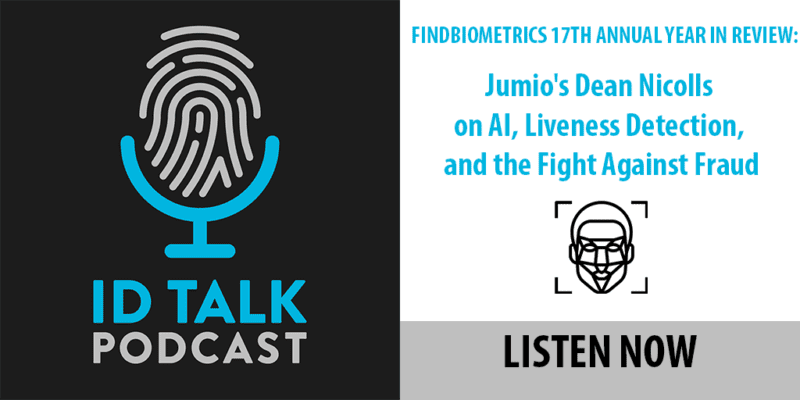
The COVID-19 coronavirus pandemic has dramatically accelerated the migration to remote work across all business sectors, giving rise to fraud threats and digital identity needs on an unprecedented scale. This is especially true in the realm of telemedicine. That’s why Jumio announced it is helping keep the economy running by offering its award winning identity verification software for free to organizations involved in COVID-19 relief.
FindBiometrics President Peter O’Neill recently spoke with Dean Nicolls, Jumio’s Vice President of Global Marketing, about the extent of the company’s offer – which, it turns out, is really quite expansive. The conversation goes on to discuss the role of AI and liveness detection in Jumio’s solution, and why those aspects have become so crucial in the era of remote work and mobile finance.
Read our full interview with Dean Nicolls, Vice President of Global Marketing, Jumio:
Peter O’Neill, President, Mobile ID World and FindBiometrics: You have just announced that Jumio will provide free identity verification services to any organization directly involved in helping with the COVID-19 relief. Please tell us more about this wonderful initiative.
Dean Nicolls, Vice President, Global Marketing, Jumio: Thank you, Peter.
This initiative extends not only to healthcare agencies, but it also extends to universities whose students are now are all at home trying to take classes and tests online. It also extends to NGOs and charities and even for example, food delivery companies. So, this offering is fairly broad.
The initiative is designed to help any of these organizations that need to verify that someone is who they claim to be online. We’re going to provide our service free of charge, at least until the pandemic subsides. And right now, we have June 30th as the rolling deadline, but that may change as circumstances change.
Peter O’Neill: Can we dive a little deeper into one particular industry that you mentioned that would benefit a lot from this, and that’s the one that’s critical for everyone right now, healthcare? Can you talk us through about how this might assist them in particular at this time?
Dean Nicolls: Sure. As we’ve all seen the news, we know what we’re supposed to do if we have any symptoms. What they tell you not to do, is to go to your doctor’s office or to your local clinic. They want you to call first, and so telemedicine is now becoming very, very important in this current situation. For a lot of healthcare agencies, they’re faced with the challenge of knowing whether the person who’s calling in is the actual patient or not. And so maybe before they dispense guidance or a prescription, they really want to make sure that that patient is in fact who they claim to be.
Unfortunately, with COVID-19, it does open the opportunity for fraud. It can be prescription fraud, it could be account fraud. And so, where our solution provides value for healthcare agencies is in making sure the person they’re communicating with is in fact who they claim to be.
Peter O’Neill: Well what a great initiative and the timing of this is just perfect. I’m sure the healthcare industry will appreciate that a lot. How does an organization apply for this? You’ve gone through what the criteria is, you want them to be involved in the actual relief; online learning you mentioned is another one with schools, et cetera, but how does an organization actually apply?
Dean Nicolls: It’s pretty simple. If you went to our website, Jumio.com, and you clicked on the hero graphic, which talks about this program, Jumio Go for Good, you’ll be taken to a page that describes the program, how it works, and there you’ll find a relatively our short application process. So we’re going to ask you for your name, your title, the name of your organization, and then just tell us briefly how you’re involved with the COVID-19 relief efforts.
We’re going to vet those and I’m guessing most of those are going to be very valid requests. And then we would work together to then onboard them and get them set up so that the process works as it needs to within their own environment. So, to be clear, the offer is not always for the verification, but that does include the initial onboarding and implementation so there aren’t any hidden fees. Everything is free to get you up and rolling as quickly as you can.

Peter O’Neill: Thank you. And for those companies in industries that are not as familiar with your technology as I am, I just want to ask a couple of questions to delve a little deeper into your actual advanced technology in document reading, face matching and artificial intelligence is obviously a critical component of that. How does AI enable such robust identification?
Dean Nicolls: Sure. Maybe I’ll take a step back and just talk about who Jumio is and kind of our purpose for being. We exist to really help make the internet a safer place. And so how do we do that? We’re in the business of proving that someone is who they claimed to be online.
There’s a lot of different ways that organizations do that today. You might say: “this is Peter O’Neill, this is my address in Toronto, Canada,” and they might ping some government issue databases to see if there is a Peter O’Neill at this address in Toronto. That is obviously somewhat risky because it’s all based on self-reported information. And if I’m a fraudster I might have access to your name and address and I could certainly pretend to be Peter very easily.
So, instead of doing that, the way the Jumio solution works is we first ask you to take a picture of your government-issued ID and that could be a driver’s license, it could be a passport or it could be an ID card. Then we ask you to take a selfie and then what we’re going to do is first of all make sure the ID itself – the ID document – is legitimate and it hasn’t been doctored or forged in any way. And then we’re going to compare the picture in the selfie to the picture on the ID document to then tell the organization that this is in fact Peter O’Neill.
There’s another wrinkle there where we’re also doing what we call liveness detection, which you guys have written extensively about on your website, is all about ensuring that the person is physically present. So not only is the ID legitimate and the selfie is legitimate but the person is physically present so they can’t use someone else’s picture or even a deep fake video to masquerade as Peter O’Neill. And the way that we do that is we take as part of the selfie taking process, we have you position your face within an oval on the screen and then move just a little bit closer and those one to two seconds, we’re literally capturing hundreds of still frames, and we can discern from that whether or not this is actually a living, breathing person or whether this is actually a picture or a video versus an actual selfie.
That whole process is infused with artificial intelligence and what we’re calling “informed AI.” And so we use AI in a number of different parts of that process. We’re using AI to make sure that when you take a picture of that ID that it is properly aligned left and right so that we can essentially OCR much of the data on that ID document. We’re leveraging AI to make sure to cover all the various security checks on the ID itself. So, if we’re looking at an Ontario driver’s license, we’re checking that it in fact it has all the security checks there, whether those be ghost texts, watermarks, etc. We’re checking for all of those various checks that is specific to that ID document.
The AI is able to detect whether the selfie is a real selfie, at which point it performs face matching between the selfie and the picture on the ID. So, almost every step of the process is infused with AI.
Peter O’Neill: Even before this current world crisis that has motivated businesses to rely on work at home strategies, there were already a lot of organizations around the world increasingly relying on remote workers. Why is it crucial to anchor trust with ID verification, and how can subsequent strong authentication help build out an unbreakable trust chain?
Dean Nicolls: Wow, that’s a good question. So the fact is, and this isn’t new information, but the world has been going mobile for the last 10 years and more and more transactions are happening on our phones and online versus someone marching into a branch office or into a physical kind of store. And so as the world has gone online and gone mobile, the needs for these types of remote services has grown. So whether you’re a bank or you’re in the sharing economy or you’re in eCommerce, you need to make sure that the person – not only who’s creating an account, but even who’s logging into an existing account – is who they claim to be. And so one of the things you kind of hinted at with the ongoing authentication is typically most of us all access our online accounts with a simple username and password.
Unfortunately, because of the dark web, we’re seeing social engineering and even deepfakes that organizations of all types and sizes need to protect those logins with a stronger form of authentication. And the good news about that is: if a company is using biometrics for at least the initial account onboarding, we actually capture a 3D face map when you go through that selfie-taking process upfront. Well, if you’re an institution, say you’re a bank and you’ve already captured that 3D face map, well guess what? If you fast forward two or three months and you, Peter, want to do a wire transfer to the Cayman Islands for $15,000 – which I’m sure is a fairly common occurrence for you – instead of just simply saying, “Hey Peter, we want to make sure that you are the actual account owner, tell us your mother’s maiden name or your first car,” which is obviously highly insecure because you’re not the only person that knows that information anymore. Why not just simply have the person take a selfie again and we go through the same selfie taking process? We would then create a fresh 3D face map compare it instantaneously to the original one that you created when you created that account several months ago and say, “Yes, this is in fact Peter, you can authorize that wire transfer.” That’s obviously a much more secure and reliable form of authentication than simply relying on knowledge based authentication or the secret questions and answers.
Peter O’Neill: Thank you very much, Dean. Always a pleasure to speak with you. I’m really pleased to see this initiative that you have started. I’m sure it will be very well received in the marketplace. And stay safe, you and your family, during this trying time.
Dean Nicolls: Thank you, Peter. Same to you and your family.


![Money20/20: Breaking Down the Jumio Go Beta Release with VP Global Marketing Dean Nicolls [Audio Interview]](https://findbiometrics.com/wp-content/uploads/M2020-2019-Dean-Nicolls-Jumio-1-e1572390914582-150x150.jpg)




Follow Us